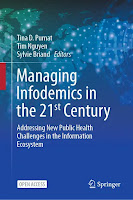There is a recording of the ACRL Education and Behavioral Sciences Section (EBSS) Virtual Research Forum, held on 3 May 2023. The 5 presentations include 3 directly relevant to information literacy:
- Paving the Way or Still Charting a Path: How Are We Measuring the Learning Effectiveness of Library Research Guides?;
- Librarians as Disinformation Experts: Is that Fake News?
- Writing Instructors’ Intentional Integration of the Information Literacy Framework.
Go to https://youtu.be/hn_HdoOEPfw
Curating information literacy stories from around the world since 2005 - - - Stories identified, chosen and written by humans!
Wednesday, May 31, 2023
Webinar recording: Learning effectiveness; misinformation; integration of IL Framework
Tuesday, May 30, 2023
#ChatGPT: Articles and links for educators; How to cite and use #generativeAI
A few generative AI links that I've been meaning to post: Firstly, a very useful categorised list of links to documents of interest to educators, which is still being added to, AI Text Generators: Sources to Stimulate Discussion Among Teachers, compiled by Anna Mills: https://docs.google.com/document/d/1V1drRG1XlWTBrEwgGqd-cCySUB12JrcoamB5i16-Ezw/edit#
Secondly, the University of Queensland's Libguide: ChatGPT and other generative AI tools: How to cite or acknowledge generative AI tools in your assignments and publications. How to cite ChapGPT and other generative AI in your assignments https://guides.library.uq.edu.au/referencing/chatgpt-and-generative-ai-tools
Finally, an article from April (which now seems so long ago, in generative AI terms....)
Pelley, S. (2023, April 16). Is artificial intelligence advancing too quickly? What AI leaders at Google say. CBS News.
https://www.cbsnews.com/news/google-artificial-intelligence-future-60-minutes-transcript-2023-04-16/
Photo by Sheila Webber: cherry blossom on a car bonnet, April 2023
Monday, May 29, 2023
New book: Managing Infodemics in the 21st Century
A new open access book is
Purnat, T., Nguyen, T. & Briand, S. (Eds.) (2023). Managing Infodemics in the 21st Century: Addressing New Public Health Challenges in the Information Ecosystem. Springer. ISBN: 978-3-031-27791-7 https://doi.org/10.1007/978-3-031-27789-4
The chapters are
- Infodemic Management in the Twenty-First Century
- Key Concepts and Definitions in Infodemic Management
- People’s Experience of Information Overload and Its Impact on Infodemic Harms
- The Information Environment and Its Influence on Misinformation Effects
- Fighting the Fallacies: The ‘Infodemic’ and the European Commission
- Smart Health! Expanding the Need for New Literacies
- To Debunk or Not to Debunk? Correcting (Mis)Information
- Prebunking Against Misinformation in the Modern Digital Age
- Addressing Mis- and Disinformation on Social Media
- Partnering with Communities for Effective Management of Health Emergencies: Four Case Studies
Friday, May 26, 2023
Continuing Professional Development for teaching information literacy & digital literacy #JornadasCRAI_UA
Today I gave a keynote presentation, Continuing Professional Development for teaching information literacy & digital literacy, for the conference XVIII Jornadas CRAI, taking place in Alicante, Spain.
Many thanks to organisers for the invitation! This was my abstract:
The questions I address are: (1) What is it important to learn about and develop, in order to be able to develop students’ information literacy (and other literacies)? And (2) What are some ways librarians can learn and develop their ability to teach and support teaching – focusing on Continuing Professional Development?
Firstly I talk about pedagogic approaches and beliefs from two aspects (1) four different ways that librarians see their teaching role (teacher-librarian, librarians who teaches, learning support, trainer) (2) What you see teaching being about – for example transmitting nformation, interacting, challenging students.
I advocate self-auditing, reflecting on where you are now and what identity and approach you aspire to. I conclude by suggesting some ways of developing your ideas about teaching and your teaching identity
I then mention needing to develop your conception of information literacy y(or whatever literacy you are teaching) I propose considering what it means to you; to your employer; to academics and students in different disciplines (that you are expected to support); to other librarians. You need to update yourself on all of these and I suggest a few ways.
Moving on to design for learning, I explain that by this I mean Identifying the outcomes for learning and assessment (if any) then going back to think what students will need to learn, and what the steps are in their learning, and only then thinking about tools and techniques. I give 3 examples – Backwards Design; Universal Design for Learning; and looking at exisiting Curricula for ideas. I also give an example of designing a strategy to try and make best use of limited face to face time with students.
Since there are so many examples of using particular tools and techniques for teaching, I do not give examples, but more straight to talking about options for learning and development for learning design and using different tools and techniques for learning
Finally, I suggest three aspects that are useful for now and the future: Familiarising yourself with new tools & techniques – but then choosing the best approach & tool for the learning need; Covering IL of visual media (how to be information literate with YouTube, Instagram, charts etc.) ; Learning about generative AI.
Here are the slides. The accompanying references etc. are at https://tinyurl.com/jornadasCRAI
Thursday, May 25, 2023
Five Ps of Learning Development; Literature search and literature review
Firstly, an article which outlines a framework which I think could also be used to identify information literacy needs. It "proposes a practical model, the Five Ps of Learning Development [LD], which integrates multiple perspectives with longitudinal, cross-sectional and socio-cultural factors
into a holistic shared understanding of the Learning Development need." The 5 Ps are: Presenting problem; Pertinent factors; perception of task; Process; Product
Webster, H. (2023). The five Ps of LD: Using formulation in Learning Development work for a student-
centred approach to ‘study skills’.
Journal of University Teaching & Learning Practice, 20(4).
https://doi.org/10.53761/1.20.4.07
Secondly a focus on carrying out literature searches and doing literature reviews on the Scholarship of Teaching and Learning (SoTL) (thanks to Nicky Williams who posted about these articles). This is interesting reading more generally as an example of scholars developing a framework for literature search/review in their field
and critically engaging with the process
Healey, M. & Healey, R. L. (2023) Searching the Literature on Scholarship of Teaching and Learning (SoTL): An Academic Literacies Perspective Part 1 . Teaching & Learning Inquiry 11. https://journalhosting.ucalgary.ca/index.php/TLI/article/view/75079
Healey, M. & Healey, R. L.(2023) Reviewing the Literature on Scholarship of Teaching and Learning (SoTL): An Academic Literacies Perspective Part 2 . Teaching & Learning Inquiry 11. https://journalhosting.ucalgary.ca/index.php/TLI/article/view/75823/
There is a blog post about the articles at https://issotl.com/2023/01/27/searching-and-reviewing-the-literature-on-scholarship-of-teaching-and-learning-sotl-an-academic-literacies-perspective-parts-1-2/
Wednesday, May 24, 2023
Recent articles: Librarians as teachers; Information Ecosystem; Impact of IL
LeMire, S., Graves, S.J., & Anders, K.C. (2023). Librarians as Teachers: Effecting Change in Composition Instruction. portal: Libraries and the Academy 23(2), 293-312. https://doi.org/10.1353/pla.2023.0011 It is a proced publication, but there is a preprint here
Kuehn, E. (2023). The information ecosystem concept in information literacy: A theoretical approach and definition. Journal of the Association for Information Science and Technology, 74(4), 434-443. https://doi.org/10.1002/asi.24733 (priced)
Li, H., Zhu, S., Wu, D. et al. (2023). Impact of information literacy, self-directed learning skills, and academic emotions on high school students’ online learning engagement: A structural equation modeling analysis. Education and Information Technologies. [early online publication] https://doi.org/10.1007/s10639-023-11760-2
Photo by Sheila Webber: red white and blue, May 2023
Tuesday, May 23, 2023
Latest episode of Chatting Info Lit
Image - Pedagodzilla logo
Monday, May 22, 2023
New articles on information behaviour
There is a valuable special issue of the open access journal Informatio (vol.28 no.1, 2023) focusing on information behaviour research, reviewing IB in specific countries or regions, plus trends in IB research.Note that when you click through to the cotents page you will see all the titles in Spanish, I have put the titles into the language of the paper. All but one paper have abstracts in Spanish, English and Portuguese. Thanks to Tom Wilson for alerting me to this.
- Thomas Daniel Wilson: building a pathway in Information Science moving towards creating and accessing inclusive information and knowledge growth by Sabelli, Martha
- Research and teaching in the 30 years in Uruguay: 1993-2023 by Sabelli, Martha
-
The Past and Future of Information Behaviour Research, Through a Wilsonian Lens by Case, Donald Owen
- Information Behavior Research in the twenty-first century: The journey so far by Agarwal, Nare
- Information behavior research in Africa: past, potential and a “cry” for impactful research by Fourie, Ina
- Information behaviour research in North America by Julien, Heidi
- Os estudos de usuários da informação na América Latina by Ávila Araújo, Carlos Alberto
- European research on information behaviour in the 21st century by González-Teruel, Aurora
-
Information behaviour research in Eastern Europe in 2013-2022 by Maceviciute, Elena
- Information behaviour research in Japan by Matsubayashi, Mamiko; Sakai, Yukiko
- Revisiting metagames and metagaming: theoretical and methodological considerations by Huvila, Isto
- Investigación sobre usuarios de la información: un recorrido desde sus inicios hasta la actualidad en México a partir del Seminario de Investigación sobre Usuarios de la Información by
González, Juan José Calva
- Docencia de Pregrado y Posgrado en Estudios de Usuario/Investigación y Docencia del Comportamiento Informacional en Uruguay (1993-2023), Producción Estudiantil by
Pérez Giffoni, María Cristina
- Producción de proyectos finales de grado y posgrado 2009-2022 centrados en comportamiento informativo en Uruguay by
Sabelli, Martha
- Pobreza de información y small worlds en usuarias del Plan Ibirapitá, hacia estrategias de información y comunicación inclusivas by Guilleminot, Carol
Go to http://www.scielo.edu.uy/scielo.php?script=sci_issuetoc&pid=2301-137820230001&lng=es&nrm=iso
Photo by Sheila Webber: cherry blossom on car windsceen, April 2023
Saturday, May 20, 2023
Extra image info on Google
Dunton, C. (2023, 10 May). Get helpful context with About this image [blog post]. https://blog.google/products/search/about-this-image-google-search/
Photo by Sheila Webber: apple blossom, May 2023
Wednesday, May 17, 2023
New articles: Citation; punk strategies; practicums
The latest issue (vol 84 issue 5, 2023) of the open-access College & Research Libraries news includes:
- Building community: DIY punk strategies for the library classroom by Edward Gloor, Kevin Adams
- Virtual LIS practicums: Student and supervisor experiences during COVID-19, part 1 by Tina Griffin, Holly Beverley
- Teaching the politics of citation: Challenging students’ perceptions by Liz Chenevey
Go to https://crln.acrl.org/index.php/crlnews/issue/view/1638/showToc
Photo by Sheila Webber: cherry blossom, April 2023
Monday, May 15, 2023
ChatGPT & #AI in search
A couple of interesting reads, related to AI and information literacy:
1) Fister. BB & Head, A. (2023, 4 May). Getting a Grip on ChatGPT:
Considering what academia got wrong about Wikipedia helps to crystallize the questions we should be asking about ChatGPT and our knowledge environments. Inside Higher Ed. https://www.insidehighered.com/opinion/views/2023/05/04/getting-grip-chatgpt
2) Bradley, P. (2023, 11 May).
Latest AI advances of interest to librarians. lis-infoliteracy [email discussion list] https://www.jiscmail.ac.uk/cgi-bin/wa-jisc.exe?A2=ind2305&L=LIS-INFOLITERACY&O=D&P=13368
Photo by Sheila Webber: blossom on the grass, April 2023
Friday, May 12, 2023
Searching with AI #Promptengineering
An interesting (though, unfortunately, priced) article:
Lo, S. (2023). The CLEAR path: A framework for enhancing information literacy through prompt engineering. The Journal of Academic Librarianship, 49(4), 102720. https://doi.org/10.1016/j.acalib.2023.102720
The CLEAR framework for searching using tools such as ChatGPT Is:
Concise: brevity and clarity in prompts
Logical: structured and coherent prompts
Explicit: clear output specifications
Adaptive: flexibility and customization in prompts
Reflective: continuous evaluation and improvement of prompts
Photo by Sheila Webber: apple blossom, May 2023
Thursday, May 11, 2023
Conference: Everyone a Researcher
Photo by Sheila Webber: fritillaries, May 2023
Wednesday, May 10, 2023
Media and Information Literacy @dw_akademie
Photo by Sheila Webber: blossom on the wall, May 2023
Tuesday, May 09, 2023
Impact of Scholarship of Teaching and Learning #SoTL
Minocha, Shailey & Collins, Trevor (2023). Impact of Scholarship of Teaching and Learning: A guide for educators. The Open University. https://doi.org/10.21954/ou.ro.000155c1
"The initiative has involved applying an Impact Evaluation Framework (IEF) to assess impact of 16 Scholarship of Teaching and Learning (SoTL) projects. The ‘guide’ details the analyses of the impact of the case studies, and provides a toolkit for planning, evaluating, and communicating impact of SoTL. Along with the guide, there are two ‘workbooks’ as supplementary resources ... The ‘Planning for SoTL impact workbook’ has been designed around the ‘Theory of Change’ to guide the educator to systematically plan a SoTL project for possible impact. The ‘SoTL impact evaluation workbook’ is designed around the IEF to conduct impact evaluation of SoTL projects."
You can also download An Executive Summary’ and A compendium of case studies
Photo by Sheila Webber: apple blossom, May 2023
Monday, May 08, 2023
Images & learning; Creativity; Usability; Architecture students; #REF21
The latest issue (vol 84 issue 3, 2023) of the open-access College & Research Libraries includes:
- The Impact of Decorative Images on Student Performance: A Two-Year Study of Online Library Modules by Alexander Deeke, Naomi Binnie
- Toward a Framework for Information Creativity by Mark Dahlquist ("Recognizing the importance of information literacy in defining the primary focus of library instruction, this paper suggests the potential utility of a complementary principle of information creativity.")
- Carrots and Sticks: A Qualitative Study of Library Responses to the UK’s Research Excellence Framework (REF) 2021 Open Access Policy by Dan DeSanto
Go to https://crl.acrl.org/index.php/crl/issue/view/1637/showToc
The previous issue (vol 84 issue 2, 2023) of College & Research Libraries includes:
- The Library Is My Canvas: Art and Experiential Learning in an Academic Library by Gerald R. Natal, David Remaklus
- More than a Decade Later: Library Web Usability Practices at ARL Academic Libraries in 2007 and 2020 by Yu-Hui Chen, Carol Anne Germain, Abebe Rorissa
- Digital Shred: Case Study of a Remote Privacy Literacy Collaboration by Sarah Hartman-Caverly, Alexandria Chisholm, Alexandrea Glenn
- Breaking Barriers: How Libraries Can Better Support Female Architecture Students for Professional Success by Cathryn Copper, Sara Jamal Eddin
Go to https://crl.acrl.org/index.php/crl/issue/view/1634/showToc
Photo by Sheila Webber: cherry blossom, April 2023
Friday, May 05, 2023
Inquiring teachers - online courses
Two upcoming online courses from Andrea Baer's Inquiring Teachers are:
- The ACRL Framework for Information Literacy: Reframing Teaching Practices. US $285 (10 July - 22 August 2023) http://inquiringteachers.com/courses/acrl-framework/
- Information Literacy in Politically Polarized Times. US $200. (16 October - 14 November 2023) http://inquiringteachers.com/courses/il-polarized-times/
Photo by Sheila Webber: cherry blossom in Cambridge, April 2023
Thursday, May 04, 2023
Information evaluation; Health literacy; Media literacy research
The latest issue of open-access Journal of Media Literacy Education ( Vol. 15, Issue 1, 2023) includes the following:
- Critical Online Information Evaluation (COIE): A comprehensive model for curriculum and assessment design by Lauren Weisberg, Xiaoman Wang, Christine Wusylko, and Angela Kohnen
- Exploring critical media health literacy (CMHL) in the online classroom by Laura Squires, Adrienne Peters, and Linda Rohr
- Evolving trend of media literacy research: A bibliometric analysis by Nese Kutlu-Abu and Rumiye Arslan
Go to https://digitalcommons.uri.edu/jmle/vol15/iss1/
Photo by Sheila Webber: blossom on the wall, April 2023
Wednesday, May 03, 2023
Media and Information Literacy curriculum in more languages #MILCLICKS penser de manière critique, hacer clic sabiamente
You can download all versions at https://unesdoc.unesco.org/ark:/48223/pf0000377068
Photo by Sheila Webber: cherry blossom, April 2023.
Tuesday, May 02, 2023
Registration open for #ECIL2023
Monday, May 01, 2023
Visual Methods Round-Up @asist_org
Advance notice that I'm one of a team delivering a workshop on visual methods as part of the ASIS&T (Association for Information Science and Technology) Annual Meeting.It is likely to be on 27th or 28th October 2023, and it will be in-person in London.
The other team members are: Iulian Vamanu (University of Iowa, USA), Judith H. Van Alstyne (University of Rochester, USA), Jenna Hartel (University of Toronto, Canada), Rongqian Ma (Indiana University Bloomington, USA), Sophie Rutter (University of Sheffield, UK)
The abstract is "Visual research centers upon images, not words or numbers. Over the past century, visual research has proliferated across the social sciences and today there are innumerable variations. This in-person Workshop “rounds-up” students, scholars, and practitioners engaged in Visual Research across Information Science. Our goals are: 1) To fortify a shared understanding of fundamental concepts associated with visual methods; 2) To showcase the diversity of image-based projects across Information Science, while offering constructive commentary and seeding friendships; and 3) To brainstorm a compelling Research Agenda that maximizes our effort and unifies our community into the future. We hope this workshop will not only deepen everyone’s understanding of visual methods, but also foster a supportive community that encourages productive collaborations among researchers focused on visual media and methodologies."
The image is by Jenna Hartel.



















